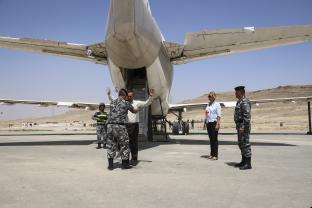
In peacetime as in armed conflict, following common Article 1 to the Geneva Conventions, States have undertaken to adopt all necessary measures within their jurisdictions to fulfill the obligation to respect and ensure respect for international humanitarian law. Accordingly, States must take action domestically to incorporate IHL into laws, regulations and policy directives. They must also ensure that the armed forces and other national stakeholders understand and respect the rules and establish mechanisms that will ensure respect for the law and appropriate handling of violations. The 33rd International Conference of the Red Cross and Red Crescent (Geneva, December 2019) adopted a Resolution on the national implementation of IHL. This highlight introduces several new and older cases on this topic and underlines the various obligations that arise in the national implementation process.
1. Resolution: The resolution entitled Bringing IHL home: A road map for better national implementation of international humanitarian law illustrates a widely shared recognition that the best way to protect victims of armed conflict is for all states and parties to armed conflict to respect IHL. Concretely speaking, the IHL road map presents practical measures, such as dissemination, training, and ratification of treaties, which can be taken by States to improve national implementation and prevent IHL violations. The message suggested by the title “Bringing IHL home” is that every State can do something to improve national implementation of IHL. It is now for States and National Societies to transform the elements of this resolution into concrete actions.
2. National Committees and similar entities on IHL: To facilitate the national implementation of IHL, it can be useful to create a dedicated working or expert group, or similar body – often called a “national IHL committee or commission”. They advise States on treaty ratification and national legislation, support the dissemination of IHL at the national level, and provide peer-to-peer support to other IHL committees, either in their region or across the world. There are currently more than 110 National IHL Committees supported by the ICRC.
3. National Legislation: In order to fulfil States obligations, such as those related to the protection of Red Cross/Crescent/Crystal emblems, the training of armed forces, arms transfers, reparations for victims of violations or the prosecution of IHL violations, IHL must be translated into national laws.
- United Kingdom, Interpreting the Act of Implementation
- Canada, Crimes Against Humanity and War Crimes Act
- Colombia Peace Agreement
- Cameroon, Law on the Protection of the Emblem and the Name “Red Cross”
- Ghana, National Legislation Concerning the Emblem
4. Role of domestic courts: National courts largely contribute to defining IHL concepts through their interpretation, namely when these notions are not sufficiently self-explanatory. The clarifications developed in national case law can also be useful to foreign courts confronted with similar situations.
- (Update) United Kingdom, Arms Trade with Saudi Arabia
- (NEW) Canada, Arms Transfer to Saudi Arabia
- Israel, Cases Concerning Deportation Orders
- Sweden/Syria, Can armed groups issue judgments?
- USA, Al-Shimari v. CACI Premier Technology, Inc.
- United Kingdom, The Case of Serdar Mohammed (Court of Appeal and Supreme Court Judgments)
5. Criminal repression: States have a duty to investigate alleged war crimes and prosecute or extradite suspected perpetrators of those crimes even if committed in foreign conflicts. Judges, magistrates, and other national actors dealing with those obligations must also be trained to ensure effective prosecutions as per required judicial standards.
- (NEW) Syria/Germany, Conviction for taking photographs
- Belgium, Law on Universal Jurisdiction
- Italy, Use of force against ambulances in Iraq
- El Salvador, Supreme Court Judgment on the Unconstitutionality of the Amnesty Law
6. Training and Dissemination: States must include IHL in military doctrine and training progammes, so that members of armed forces are trained to implement IHL in concrete situations, such as surrendering of enemy soldiers on the frontline. States must also ensure that there are available legal advisers properly trained in IHL to advise commanders. States must also disseminate IHL as widely as possible to their population.
- Central African Republic, No Class: When Armed Groups Use Schools (importance of dissemination)
- Nigeria, Operational Code of Conduct
7. Cases from “IHL in Action”: IHL in action: Respect for the law on the battlefield is a collection of real case-studies documenting compliance with IHL in modern warfare. Here is a selection of three cases of respect related to national implementation.
- Mali, France’s Operation Serval, Minimising Civilian Casualties
- Afghanistan, Implementation of a Civilian Casualty Tracking Cell
- Iraq, IHL Training Involving Kurdish Armed Groups
8. The Law: Information on national implementation can also be found in "The Law" section on this platform. It features a detailed teaching outline about Implementation mechanisms; State responsibility ; Criminal repression.
9. A to Z : This online "dictionary" regroups definitions, legal bases, case studies, bibliographies and other resources about Implementation ; National commissions of implementation ; Dissemination ; Respect and Ensure Respect ; Training; Commanders; Legal adviser; Enquiry; Grave breaches; War Crime ; Breach; Violations; Genocide; Crimes Against Humanity; Individual Criminal Responsibility; Universal Jurisdiction; Extradition.
10. To go further: Here is a selection of ICRC ressources that can help disseminate and implement IHL.
National Implementation Database, ICRC, Geneva, 2019: https://ihl-databases.icrc.org/applic/ihl/ihl-nat.nsf/vwLawsByCountry.xsp .
Table of National Committees and other national bodies on international humanitarian law, ICRC, Geneva, 2018, available here: https://www.icrc.org/en/document/table-national-committees-and-other-national-bodies-international-humanitarian-law.
ICRC, Implementing International Humanitarian Law : from Law to Action, ICRC, Geneva, 2019: https://www.icrc.org/en/document/implementing-international-humanitarian-law-law-action.
ICRC, Criminal repression of serious IHL violations: Information Kit, ICRC, Geneva, 2017: https://www.icrc.org/en/document/criminal-repression-serious-ihl-violations-information-kit.
ICRC, Integrating the Law, ICRC, Geneva, 2007, 43 pp: https://www.icrc.org/en/doc/assets/files/other/icrc-002-0900.pdf.
ICRC, Decision-Making Process in Military Combat Operations, ICRC, Geneva, 2013, 53 pp: https://www.icrc.org/en/doc/assets/files/publications/icrc-002-4120.pdf.
Learning and teaching IHL, ICRC, 2019: https://www.icrc.org/en/what-we-do/building-respect-ihl/education-outreach.
